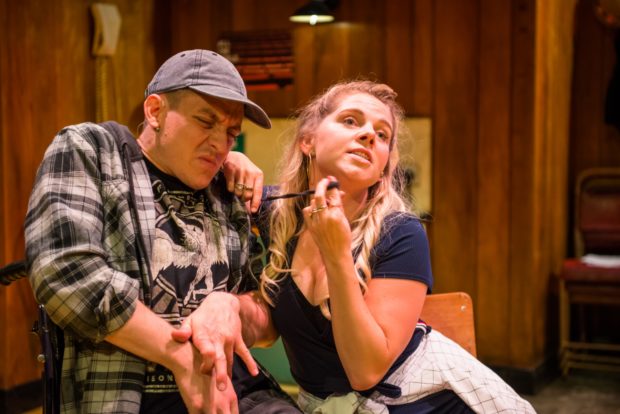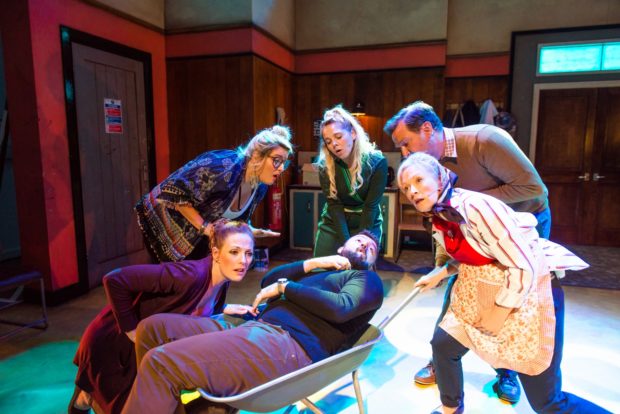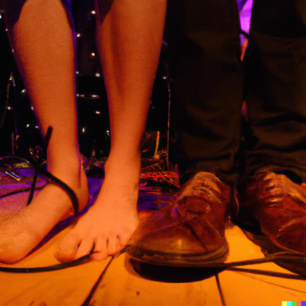PREVIEW: DISABILITY-LED MUSICAL MY LEFT/RIGHT FOOT AT THE EDINBURGH FRINGE
Mustapha , December 7, 2022
To succeed in amateur dramatics, risks have to be taken. When training their eyes on the looming Scottish Amateur Dramatic Society competition, a small group of players learn points are awarded for diversity and decide to do the logical thing: mount an adaptation of My Left Foot. The 1989 film about the life of the artist Christy Brown, a man who used the toes of one foot to write and draw due to cerebral palsy, is clearly ripe for an am-dram adaptation. They cast an actor without cerebral palsy to play Brown, of course, in the spirit of Daniel Day-Lewis. And why not make it a musical while they’re at it?
It’s this piling up of absurdities that makes My Left/Right Foot, the new musical written and directed by Robert Softley Gale (Wendy Hoos, Girl X, If These Spasms Could Speak), a sly and remarkable beast. A co-production with National Theatre of Scotland which is currently playing at the Edinburgh Fringe, this marks the 25th anniversary of his disability-led company Birds of Paradise, formally established as Scotland’s first touring theatre company to employ both disabled and non-disabled actors.
Softley Gale is upfront about the edge humour lends to any point they wish the production to make. “Comedy is our essential element, it’s always the best way of disarming people,” he says. From there, he points out, the conversation can be continued. My Left/Right Foot leans heavily into this disarming feeling, using it to unbalance everything. In casting Christy Brown, the Kirktoon Players pass over Chris (Matthew Duckett), their stagehand who actually does have cerebral palsy, and his sharp evaluation of their choice adds to the general chaos of the production.
Softley Gale, an actor, writer and director with cerebral palsy himself, had a similar experience to Chris when he used to take part in an amateur dramatic group with his family in Kirkintilloch, near Glasgow. Though he was involved backstage, “it was never seen as a possibility that I’d be onstage,” he remembers. In his new show he is eager to refocus attention back onto Brown, away from Day-Lewis’s portrayal and onto the fact of his casting in this role. And if some fun can be poked at non-disabled creatives continuing to make the same mistakes, all the better.
“This is still happening, of course,” he notes. “Accessibility is about listening and responding to people, and in terms of casting, that means casting for the show you’re making first, and putting disabled people in an integral position, not just a tokenistic one. For that reason, we wanted to do something that might make a big impact – that could both speak to issues we know are important and attract attention.”

My Left/Right Foot boasts original music from the award-winning partnership Noisemaker (Forest Boy, Freakshow, Atlantic: A Scottish Story), which consists of Claire McKenzie and Scott Gilmour. It’s their first collaboration with Robert, and there are also two songs by Richard Thomas of Jerry Springer: The Opera in the show. “I’ve written lyrics and songs before,” Softley Gale says, “but nothing on this level, and I wanted to work with the best.”
McKenzie and Gilmour have worked together for six years now since meeting at the Royal Conservatoire of Scotland, but this is the first straight comedy they’ve worked on. McKenzie echoes Softley Gale on the genre – “It’s been a useful tool in accessing certain subjects.”
Making the show a musical, Gilmour and McKenzie argue, will also make audiences receptive to its political message. “We have to be questioning ‘Why music? What’s it bringing to the table here?’” Gilmour says. “If that’s in place, it brings this lightness and accessibility to the subject matter.” McKenzie agrees: “The style and feel of things are more familiar to the audience, but the subject matter of the songs is what’s different. It’s often quite pop, quite contemporary, but then shifts into homages to other styles with very big, bold colours.”
Perhaps the most unusual feature of My Left/Right Foot – and particularly striking for a musical – is the inclusion of Natalie MacDonald as both actor and integrated British Sign Language interpreter. Softley Gale and I compare notes on similar efforts on the part of various productions, most commonly extending to just one BSL-integrated performance in a run which easily missed by hard of hearing audience members and quickly done away with if demand isn’t deemed high enough. Both McKenzie and Gilmour are quick to note what a learning experience MacDonald’s participation – their favourite element of the production – has been for them.
“When the interpreter is brought in earlier, there’s a better job done generally,” Claire explains. “[MacDonald plays] a character within the show, as close to the action as possible and active within the scenes. You don’t have to be distracted by or choose to ignore signs that are to the side of everything going on. She’s a part of the story, adding another layer to the process of writing the lyrics and songs, affecting the pace of the musical direction.” MacDonald’s signing has been used in the development of the musical’s choreography, another stream of information available for the audience to read alongside the body language of the actors, their speech, and the lyrics and music of the songs.

The pair are clear that they don’t want this level of engagement with the issue of accessibility to end here in their work. “Just a year ago, perhaps,” Gilmour says, “this wouldn’t have been possible for us. We weren’t ready. But we’re at this point as artists where we want to keep thinking about this: not just doing a one-off performance for the visually impaired, or one BSL performance, but opening it up so people can come whenever they want.
For his part, Softley Gale is unequivocal that he’s witnessed change slowly taking place for disabled people in the arts. “I was thirteen when I started out, and there was no representation. It really was Daniel Day-Lewis, he was what there was, the most recognisable.”
He’s ever-practical, however, with regards to the progress yet to be made, and cautiously open to the musical, which has received excellent reviews, developing further – “We’ll wait until Edinburgh is finished with.” The distance won’t be made up by one production, but with its all too rare emphasis on accessibility and firm denouncement of the notion that disabilities are something to be overcome, UK theatre is in sore need of the likes of My Left/Right Foot.




